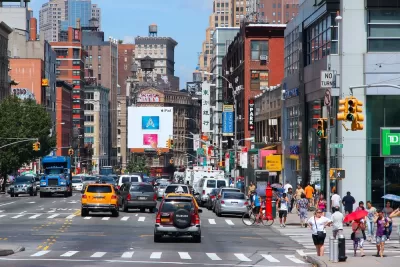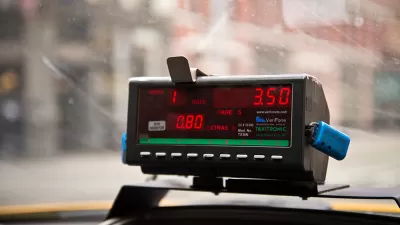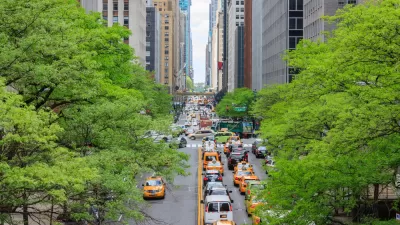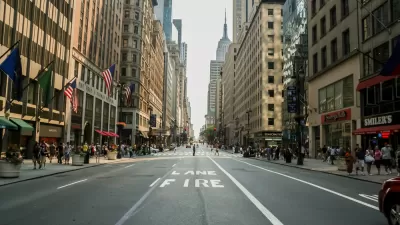A new fee on trips made in ride-hailing and other for-hire vehicles and taxis in much of Manhattan was approved by the New York State legislature as part of the budget legislation. Plans for future tolls on cars and trucks weren't included.

"As part of a $168.3 billion [New York State] budget approved overnight Friday [March 30], lawmakers inserted a new fee of $2.75 per trip on for-hire vehicles [FHV] — which in New York City includes ride-hail services like Uber and Lyft as well as traditional black cars and liveries — if the trip starts or ends in Manhattan south of 96th Street," report Dana Rubinstein and Jimmy Vielkind for POLITICO New York on April 2.
Taxi trips, which are already subject to a 50-cent surcharge throughout the city, would now be subject to a $2.50 fee in the same area. Car pool services like Via [and uberPOOL] would be charged 75 cents per trip.
"It was the easiest of all of the possible steps they could have taken, and we know it really won’t solve the problem," said Nick Sifuentes, executive director of the Tri-State Transportation Campaign, a non-profit, transportation policy advocacy organization.
Sifuentes is referring to the three revenue measures included in the January 2018 Fix NYC Advisory Panel Report [pdf] released in late January. In addition to the fees on taxis and FHVs, the panel recommended "a zone pricing program, first for trucks, and then for all vehicles, entering Manhattan’s CBD below 60th Street."
The real question facing both supporters and opponents of Manhattan cordon area congestion pricing is whether the new fees are the beginning or the end of the Fix NYC report's recommendations.
"In a sign of things to come, the congestion zone was not in budget amendments submitted by the governor, or in budget proposals by the Republican-led Senate and the Democrat-dominated Assembly," reported Winnie Hu for The New York Times on March 31.
The budget agreement drew criticism from a coalition of transportation advocacy groups which expressed disappointment that months of pushing for congestion pricing had yielded so little.
“Fixing our transit system should have been Albany’s first priority this year,” they said in a joint statement. “Unfortunately, the final budget does not offer a credible plan to modernize the M.T.A., nor provide a sufficient revenue stream to make it possible. The crisis in our subways and on our streets will continue, and New Yorkers will continue to demand action from Governor Cuomo and state lawmakers.”
While not nearly as much as a cordon toll applicable to all vehicles, the aforementioned fees "generate some $400 million a year for the Metropolitan Transportation Authority [MTA]," according to the governor’s office estimates, report Rubinstein and Vielkind.
Scott Rechler, a developer and Cuomo appointee to the MTA board who sat on the Fix NYC Panel, said, “The [for-hire vehicle] thing is important because it provides another source of revenue and provides the foundation for congestion pricing, which, if we keep applying the pressure, is something that can happen in the next 12 to 18 months.”
The Democratic-controlled Assembly did not support the full Fix NYC cordon pricing plan, with many outer-borough representatives whose constituents lack direct access to subways opposed. Democrats proposed a $1 statewide ride-hailing fee in addition to the congestion zone fee, with all revenue dedicated to transit around the state, reported Rubinstein and Vielkind on March 23.
“We’re looking for a surcharge on those for-hire vehicles that are in the zone and dedicate that funding to the subway funding, long-term, and use it as step one in an overall congestion pricing plan,” Cuomo said during a Friday afternoon call to NY1.
Transportation network companies expressed support for the Fix NYC plan, but not the stand-alone FHV fee, and also opposed the $1 "outer borough fee" in the Democrat's plan.
With Republicans who control the state Senate saying they’re opposed to any new taxes, it's surprising to this California-based correspondent that proponents were able to retain the zone fee for FHVs.
Cuomo takes criticism
"Mr. Cuomo, a Democrat who faces re-election in November, came under increasing criticism from advocates who said he did not do enough to move congestion pricing forward," wrote Hu of the Times. "They pointed out that he did not aggressively line up legislative support as he had with other divisive issues such as same-sex marriage and the minimum wage — a suggestion the governor’s aides rejected."
Advocates to persist
The Fix NYC Coalition, composed of 16 groups from business, labor, environment, transportation and planning sectors, issued the following statement on April 2:
“Albany must now finish the job by enacting the remainder of the Fix NYC plan, including establishing a congestion zone around the Central Business District...The Fix NYC Transit coalition is committed to seeing this process through to the end and won’t rest until the full Fix NYC recommendations are adopted and implemented.”
More reading: "NYC politicians, transit advocates react to Cuomo’s 2019 state budget," Metro NY, April 2.
Related posts in Planetizen:
- "Road Pricing Shouldn't Stop at Ride Hailing Services," March 8, 2018
- "Congestion Pricing—Only for Ride-Hailing Services," January 5, 2018
Hat tip to Eno Transportation Weekly.
FULL STORY: Cuomo defends a small step toward congestion pricing

Alabama: Trump Terminates Settlements for Black Communities Harmed By Raw Sewage
Trump deemed the landmark civil rights agreement “illegal DEI and environmental justice policy.”

Planetizen Federal Action Tracker
A weekly monitor of how Trump’s orders and actions are impacting planners and planning in America.

The 120 Year Old Tiny Home Villages That Sheltered San Francisco’s Earthquake Refugees
More than a century ago, San Francisco mobilized to house thousands of residents displaced by the 1906 earthquake. Could their strategy offer a model for the present?

In Both Crashes and Crime, Public Transportation is Far Safer than Driving
Contrary to popular assumptions, public transportation has far lower crash and crime rates than automobile travel. For safer communities, improve and encourage transit travel.

Report: Zoning Reforms Should Complement Nashville’s Ambitious Transit Plan
Without reform, restrictive zoning codes will limit the impact of the city’s planned transit expansion and could exclude some of the residents who depend on transit the most.

Judge Orders Release of Frozen IRA, IIJA Funding
The decision is a victory for environmental groups who charged that freezing funds for critical infrastructure and disaster response programs caused “real and irreparable harm” to communities.
Urban Design for Planners 1: Software Tools
This six-course series explores essential urban design concepts using open source software and equips planners with the tools they need to participate fully in the urban design process.
Planning for Universal Design
Learn the tools for implementing Universal Design in planning regulations.
Clanton & Associates, Inc.
Jessamine County Fiscal Court
Institute for Housing and Urban Development Studies (IHS)
City of Grandview
Harvard GSD Executive Education
Toledo-Lucas County Plan Commissions
Salt Lake City
NYU Wagner Graduate School of Public Service





























